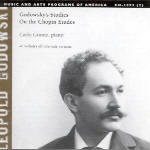The inherent challenges of Leopold Godowsky’s 53 Studies on Chopin Etudes add up to a veritable Everest of superpianism that only a select few performers have braved with success. Carlo Grante’s 1993-98 Altarus recordings were justly acclaimed at the time of their release. In January 2000, Grante re-recorded the Chopin/Godowsky Studies for Music and Arts. Generally speaking, Grante opts for faster tempos this time around and achieves more compact results by using less sustain pedal and economizing on rubato. The close-up, full-bodied engineering enhances Grante’s streamlined refinements of touch and balances between the hands. In “Ignis fatuus”, for example (based on Chopin’s original A minor Etude Op. 10 No. 2), Grante projects the left hand’s steady 16th-notes more evenly against the right hand triplets. Similarly, the pianist brings suaver polyphonic interplay to the brilliant F minor study where the patterns of Chopin’s Op. 10 No. 9 F minor original imitate the Op. 25 No. 2 etude in the same key.
Yet I find some of the earlier recordings more appealing–and not only because Altarus offers warmer, more resonant sonics. There are instances in the Altarus versions where Grante’s subjectivity pays more poetic dividends, such as his spacious delineation of Study No. 45’s entangled counterpoints. By contrast, the remake barely has time to breathe. Back-to-back comparisons with Marc-André Hamelin’s award-winning Hyperion Chopin/Godowsky set reveal the Canadian pianist’s fleeter, suppler way with the studies for left hand alone, and a suaver tone that’s abetted by Hyperion’s superior engineering. For sonic splendor and pianistic refinement, Hamelin’s Chopin/Godowsky still stands as the reference version. But Grante’s achievement is no less significant, and there aren’t too many pianists in the world that can match it. Booklet notes include Heinrich Neuhaus’ recollections of his lessons with Godowsky, an essay on the Godowsky/Neuhaus connection, and Grante’s cogent, pianistically-oriented observations about the music.
































